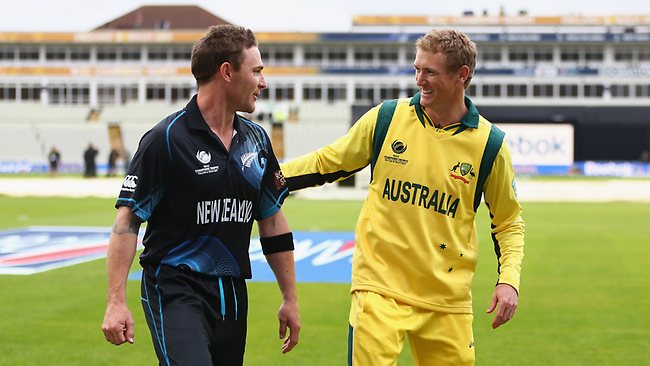Australia's Ashes hopes in ruins as team implodes on and off field
IT is difficult to think of any recent Ashes contest in which one of the teams has been in more of a mess before the series than Australia is now.
IT is difficult to think of any Ashes contest in recent years in which one of the teams has been in more of a mess before the series, on and off the field, than Australia are right now.
News of David Warner's altercation with Joe Root during the early hours of Sunday morning in Birmingham merely adds more evidence to the suspicion, heavily supported during the recent tour to India, that they have lost their bearings.
Events on the field in India could be said to have little relevance to what happens in the Ashes, given the totally different conditions. But it was always the feeling here that the off-field embarrassment, when four players were publicly humiliated for not completing their trite "homework" task, would have long-lasting and deleterious consequences.
Cricket Australia would have been better at that point - and in the wake of the 4-0 thrashing - cutting its losses with the management team, making a swift and brutal change and a fresh start.
What was remarkable was how much public support within Australia the disciplinary measures received in the wake of the Indian humiliation.
Mickey Arthur's "line in the sand" moment was parroted by many who directed their ire towards the recalcitrant players.
Yet more recently, comments by James Sutherland, the CEO of Cricket Australia, suggested that there was enormous disappointment that things had been allowed to drift so badly that such action was deemed necessary. This latest breakdown in discipline, a line in the sand that has been crossed again, must put the management on borrowed time.
But it is too late for any decisive action now and Australia must stagger on through the Ashes with the same players and same management when clearly there has been a breakdown in relations between them.
For while Warner's behaviour reflects principally upon himself, it also reflects upon the lack of respect between the team and their leaders; any player with an ounce of grey matter would have realised the parlous situation they find themselves in and would not have wanted to add to that pressure.
Warner is not the first young player, nor will he be the last, to mess up. Perhaps his best role model is one of the greatest Australia players of all time, Ricky Ponting, who memorably was forced to confront his drinking demons, after a fracas in the Bourbon and Beefsteak nightclub in Sydney in 1999.
Ponting, sitting in a press conference with a black eye, had to recall publicly an evening on which he had drunk too much, been punched and then woken up in his hotel room hours later with little recall of events, save for the evidence of his shiner.
Ponting not only became one of the all-time greats, but a cricketer admired and respected in equal measure. The incident was one of the key moments in his career, because at that point he had two options: to deny that his behaviour was a problem, or admit to it and confront the issue full on. He chose the latter course on the basis that to solve a problem, you have to admit to it in the first place. Warner needs to be equally frank with himself.
Of course, as one of the outstanding young players in the country, Ponting was afforded more time and patience than might have been given to others. Warner is not in Ponting's class, but he remains a cricketer of considerable ability and one whom Australia can ill afford to lose, given that their batting cupboard is emptier now than at any time in recent history.
Warner's recent behaviour, highlighted by his Twitter spat with two Australian journalists, suggests someone struggling to come to terms with his responsibilities. He needs to help himself, but he needs support as well.
Having dropped four players for the third Test in India and having fined Warner $5750 for his Twitter rant, the options for further punishment have been whittled down rapidly. Given that modern sporting teams pride themselves on their pre-tour preparations, Australia find themselves in apparent disarray with only a month to go until the first Ashes Test in Nottingham.
There is as yet no inkling as to when or whether Michael Clarke, the captain, will be fit. The early part of any tour is vital for a captain to set out his stall, but Clarke has been absent from the team while he has been getting specialist treatment to his back in London. George Bailey, not part of Australia's Ashes squad, has been thrust into an unenviable situation as leader without portfolio. The team need their captain like never before.
The Champions Trophy gave Australia an opportunity to show that they had moved on from the horrors of India and they had hoped to give England a reminder of the threat they could pose when they met at Edgbaston on Saturday. Yet they looked utterly lacklustre with the bat and the early signs were that weaknesses remain.
Shane Watson was shackled well enough; Phil Hughes looked jumpy against the seam bowlers and uncertain against off spin, and ran erratically between the wickets; and the selectors did themselves few favours by leaving out a specialist spinner on a dry-looking pitch.
It was left to Bailey to reflect on defeat, which he did only by casting aspersions on how England had managed to find reverse swing, where his own seam attack could find none.
Quite what Australia's best team will be for the first Test is anybody's guess. They have a line-up that is top-heavy with opening batsmen - Ed Cowan, Watson, Hughes, Warner and Chris Rogers - all of whom have a question mark against their names, and they are light on quality middle-order players, even if Clarke's fitness issues relent.
The return of Brad Haddin, the wicketkeeper and vice-captain, will at least add significant input to a leadership group that is threadbare.
Early-tour off-field setbacks rarely bode well. In 2005, Andrew Symonds was disciplined for turning up so drunk that he fell over a wheelie bin before a defeat by Bangladesh, an early sign of discord and disharmony before an eventual Ashes defeat.
Details emerged afterwards of a drinking culture that prevailed throughout England's Ashes whitewash in 2006-07. ("It was like being on a booze cruise," Andrew Flintoff, the captain, wrote in his autobiography.)
The dropping of Warner for last night's match against New Zealand may yet prove to be an isolated incident on this tour. Stories may emerge - rumours were swirling around Edgbaston yesterday - that the England players who were out that night with Warner were not without fault.
Certainly, it adds extra spice given that the England management was less than enamoured with Arthur's public comments on the Kevin Pietersen affair a year ago. There is no love lost between them.
Regardless of all that, Warner's recent behaviour fits into a pattern of general ill discipline that, allied to struggles on the field, give the appearance that Australia are in disarray. And now very short of time.
The Times





